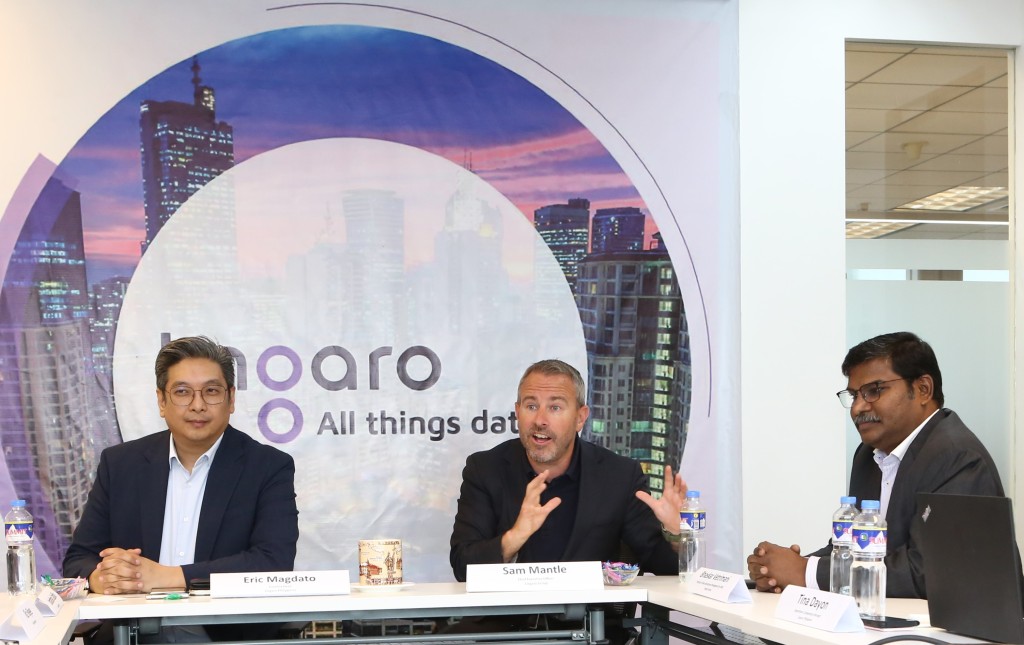

For the past one and a half decades, the Lingaro Group, a Warsaw, Poland-headquartered, end-to-end, data service provider, created disruptive innovation for over 100 billion-dollar brands.
Its clientele covers more than 75 leading consumer-packaged goods (CPG) firms in over 30 countries, including three in the world’s top ten list.
Now, “We’re building for the next 15 years and the Philippines is playing a key role,” Lingaro Group CEO Samuel Mantle told reporters during the company’s first ever briefing with local media, Thursday, October 12, at their AIA Tower, Makati office.
That day also marked Lingaro’s 10th year in the country, its second highest performing location worldwide, after Poland.

Interestingly, the Lingaro Group is the only global technology company which honored the Philippines by taking the name of a native berry.
The Group’s Polish co-founder married a Filipina and named his enterprise after Elaeagnus Philippinensis (Lingaro), a local shrub bearing sweet-tart berries used to make pies, jams and jellies.

“All other fruits had been taken by tech companies,” quipped Eric Magdato, Lingaro Philippines Country Head.
Steve Jobs picked the name Apple for his venture, which gained fame for its iPod, iPhone and MacBook.
When computer systems called themselves Tangerines, Apricots and Acorns, UK’s Raspberry Pi got its moniker from the bramble fruit.
And classic phone producer Blackberry adopted the name of the fruit whose drupelets resembled its keyboard buttons.
So far, Fate has favored Lingaro for its name choice.
Lingaro, which is not publicly listed, hauls in around $120 million revenues per annum, according to online intelligencer estimates.
The Group caters to an international Analytics market which will hit $750 billion by 2030, on a Compound Annual Growth Rate (CAGR) of 13.5 per cent.
The Asia Pacific (APAC) Analytics market alone is estimated to be worth $70 billion by 2026.
In the Philippines, specifically, the Artificial Intelligence (AI) and Analytics Market is expected to grow from $800 million in 2023 to $3 billion in 2030, posting 20 per cent annual growth CAGR.
Overall, “We are targeting 20 to 30 per cent revenue growth in four to five years, a healthy rate,” says Mantle.
“For now, we’re happy with our growth and market share.”

Significantly, Lingaro Philippines thrives on challenges. During the pandemic, the company hired half of its talent pool outside Metro Manila.
By 2019, Lingaro has a local workforce of 100 employees, which tripled to 300 last year.
“We expanded globally and acquired over 20 new clients in 2021 and 2022, our pivotal years,” Mantle noted.
Furthermore, both clients and employees recognized Lingaro Philippines as a “Great Place to Work” in those two consecutive years.
“We chose the Philippines (as our location) for its strong talent pool. It’s our number one factor for choosing this country,” the Lingaro CEO acknowledged.
“Our ability to develop talent is at the core of our business. We are a people company. Our only assets are our people and the knowledge in their heads.”
Lingaro Philippines serves local enterprises, including a large manufacturing company and a financial institution, according to Bhaskar Vetrimani, Director of Sales and Account Management for APAC.
In addition, it supports the Group’s global clientele in consumer goods, manufacturing, retail, luxury, and life sciences sectors.
The company leads clients through their entire data journey, from strategy through development, to operations and adoption, enabling them to realize the full value of their data.
Data happens to be a company’s most valuable asset. But at the same time, it is also the biggest problem, due to its sheer volume.
The task of organizing, cleaning, securing, converting that data to useful corporate strategy and maintaining it, is a continuous process that takes months and years.
“The challenge of CEOs today is how to leverage the power of data. This is the gap we fill,” Mantle explained. “Everyone thinks it’s a technology problem but it’s a data problem. The biggest challenge for companies is to bridge the gap between business and technology. We’re trying to be that bridge.”
“The data of big conglomerates sits in fragmented systems. And they don’t know where to start,” he pointed out. “Some have good vision but they dont know how to execute the vision. So, we orchestrate their data ecosystem.”
Lingaro itself is getting bigger.
Recently, it acquired a couple of companies in the consulting space and plans to acquire more assets and capabilities to drive its growth.
Todate, Lingaro has two offices in Poland – Warsaw and Lublin; two in Switzerland – Zürich and Geneva, along with an office in Manila, Singapore, Mexico City, Cincinnati, USA and Bangalore, India.
And it’s eyeing to expand operations in Australia and Japan.
“After doing business for 15 years, we’re building for the next 15,” the Lingaro CEO reiterated.

